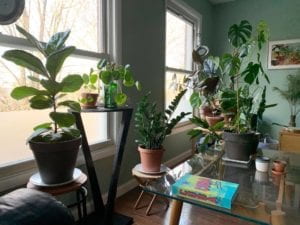by Jane O’Mahony
Taking care of a plant is similar to self-care! Just like you, plants need certain things in order to THRIVE:
- A regular intake of water to keep hydrated
- Food for strength
- Daily access to light
- Enough personal space to allow for growth
- A friend that looks out for you
TIPS
 Healthy Soil is Key :
Healthy Soil is Key :
- Healthy, well drained soil is essential for a plant to thrive. Check the soil every time you water your plant to see if it needs assistance. The best way to keep your soil healthy is to make sure it has good drainage, meaning that when watering, the water is able to moisten all the soil and the excess can run through the soil into a saucer that should be emptied if it becomes too full.
- Be on the lookout for compacted soil. Sometimes, when a plant doesn’t get watered enough, the soil can get dried out and compacted. When this happens you will notice when you water the plant, the water tends to drain around the gap at the edge, where soil meets the pot and doesn’t actually go through the center of the soil, which is where the plant needs it the most. To solve this problem, use a skewer or chopstick to poke approximately 1-2” into the soil, multiple times, in order to loosen the soil so the water can get to the roots.
- If your soil becomes too moist try to address this problem quickly in order to avoid root rot and potentially losing the plant. First, ensure that you don’t leave your plant sitting in water for too long. Empty the saucer if it fills up after watering your plant. A pot that is left sitting in water will absorb the water up through the soil and can make the soil soggy. To help dry out soil that is soggy, use a chopstick to poke the soil to loosen it up and allow the air to get in to help it dry out.
Knowing the right amount of water:
- A plant that is overwatered or under-watered can look similar. Both can appear to have drooping leaves. The leaves will droop if the plant is under-watered because the roots are not getting water. The leaves will droop if a plant is overwatered because the roots have likely begun to rot from too much moisture and therefore the root cannot pull water efficiently from the soil. Before watering a plant with drooping leaves, make sure you feel the soil to see if it is dry or wet and use the appropriate soil techniques shared earlier in this article to correct accordingly.
- Choose the right plant for you. Some plants can tolerate over-watering more than others and some plants tolerate a lack of water more than others.
Amount of light determines the plant for you:
- For your plant to feel at home it needs to receive the right amount of light. Assess the light in your home or in the place you want to put the plant and buy the plant based on the light that it will have access to. When choosing a plant, make sure that you can accommodate its needs before purchasing. Most store bought houseplants will have a tag on it that lets you know how much light it needs. Plants for sunny windows include Aloe Vera, Jade plant and the Snake plant. For low light spaces and easy care choose a Peace Lily, Pothos or Chinese Evergreen.
Feeding time helps revive struggling plants:
- Store bought plants are often planted in soil that has chemical fertilizer. After a number of months, the plant uses up all of the fertilizer in the soil and it will need you to add additional fertilizer to help the plant stay healthy and keep growing.
- Natural organic fertilizers are better for the environment and are more work since they don’t have specific nutrient rations like chemical fertilizers do. Chemical fertilizers may be cheaper and easier to use, however they have negative impacts on the environment during their production.
Benefits of plants:
- There are numerous studies that show that being around plants makes us happier and healthier and have both psychological and physical benefits. Having plants around you when you are doing focused activities helps you focus. And the more the merrier!
- Horticultural Therapy is a professional practice that uses plants and gardening to improve mental and physical health and is used in a variety of therapeutic and social settings. Plant activities can be used for physical rehabilitation, to promote healing and bring a sense of calm. This is a growing profession due to its effectiveness.
Many plant varieties are easy to propagate. So, filling your home or office with plants or sharing with friends and family can be easy and inexpensive. Start with one plant, and go from there!
Jane O’Mahony is the Office of Sustainability’s Administrator, providing administrative support for all of the Office programs. She oversees the Office’s financial and HR related matters, in addition to contributing to any event planning and scheduling. Jane joined NYU in 2004 and previously worked with the Facilities & Construction Management and Energy Engineering teams. Her studies include Liberal Arts, Horticulture and Horticulture Therapy.
